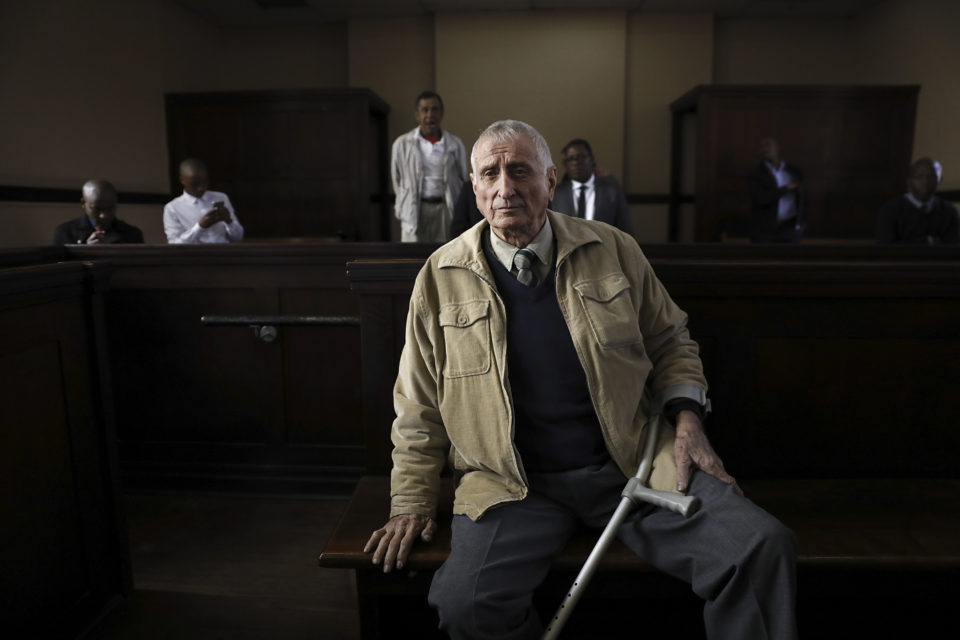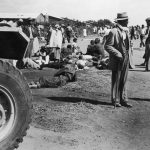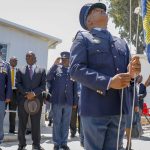Timol murder a watershed case
If the court grants Joao Rodrigues a stay of prosecution for the murder of activist Ahmed Timol, it will set a dangerous precedent for other apartheid-era crimes.
Author:
3 April 2019

William Kentridge’s 1994 animation Felix in Exile contains several scenes in which dying, bleeding black bodies are covered by floating newspapers and dirt before being enveloped by the landscape around them.
The fallen are consumed by the progress of the world they fought for and the newspapers, as symbols of media coverage and public attention, briefly take heed of their martyrdom before moving on to the next attraction.
It seems an apt metaphor for the agonies of those who lost loved ones during the struggle against apartheid and who are still seeking answers and justice – fighting to dig up the landscape that has grown over the bodies and exhume them, bring them home, find some sort of peace.
Related article:
Perhaps no case better exemplifies this Sisyphean task than that of Roodepoort teacher and ANC and SACP activist Ahmed Timol.
Arrested at a roadblock in Coronationville in the west of Johannesburg on 22 October 1971, Timol died five days later when his body fell from the window of room 1026 of the country’s most notorious police station, John Vorster Square.
An inquest into his death the following year found that “no one was to blame” and that Timol had committed suicide. His family refused to believe the findings. Timol may have been an activist and a communist, but he was also a Muslim and his faith would never have allowed him to consider suicide as an option.
Quest for justice
His mother, Hawa Timol, appeared before the Truth and Reconciliation Commission (TRC) in 1996, but nobody involved in her son’s death applied for amnesty and she died soon afterwards.
The quest for justice was taken up by Timol’s nephew, Imtiaz Cajee. In 2017, after two decades of private investigations and supplications to the state, the inquest into Timol’s death was reopened.
In spite of the fact that the two main suspects – Security Branch officers Johannes Gloy and Johannes van Niekerk had died – Judge Billy Mothle found that Timol’s death had not been an accident, that the Security Branch was directly responsible for his murder and that Joao Rodrigues, a former administrative clerk for the Security Branch, who had been present in the room when Timol supposedly jumped out of the window of room 1026 – should be prosecuted for lying about his involvement and helping to cover up the murder.
For the past year, since he was officially charged with premeditated murder and defeating the ends of justice in the Timol matter, Rodrigues’ legal team has been arguing that he should not have to stand trial because of his age, his poor memory and the inordinate delays to which he has been subjected.
Rodrigues would have the state, the Timol family and the public believe that he has never evaded justice because he’s been living at the same address in Pretoria for more than half a century, was questioned about the case by a TRC investigator and that, even though he declined to apply for amnesty, has nothing to hide and stands by the story he told at the original 1972 inquest and the subsequent one in 2017.
A huddle of lawyers
Rodrigues was absent from the hearing on 28 and 29 March before a full bench of the South Gauteng High Court, comprising Judges Seun Moshidi, Jody Kollapen and Ingrid Opperman. His legal team argued that allegations of political interference in attempts by the National Prosecuting Authority (NPA) to prosecute post-TRC apartheid-era cases make him a victim of an unjust system and impede his rights to a fair trial.
Before scoffing at the brazenness of such a claim – after all, how could political interference, which has been shown to blatantly affect victims’ rights for the purpose of protection of perpetrators be used by a perpetrator to cry foul? – it is worth noting that there are several much larger issues at stake in Rodrigues’ stay of prosecution hearing than whether or not the 80-year-old is guilty or innocent of the death of Ahmed Timol.
You could tell something was afoot by the sheer number of legal representatives attending the hearing in courtroom 11F of the South Gauteng High Court in downtown Johannesburg on 28 March. Lawyers for Rodrigues and the Timol family sat next to not only counsel for the NPA and the National Director of Public Prosecutions (NDPP), the minister of justice and minister of police, but also several representatives of organisations that had applied to make representations as amicus curiae or advisers to the court in the case.
They included counsel for a group of former TRC commissioners, the South African Litigation Centre, the Pan African Bar Association and the Law Society of South Africa. That’s more than enough lawyers to change several light bulbs and a suspiciously large contingent for the case of one 80-year-old former security police officer.
Affidavits and delays
To understand the allegations of political interference, it is necessary to go back to 2015 when Thembi Nkadimeng, the executive mayor of Polokwane, brought a case to compel the NPA to open an inquest into the disappearance and murder of her sister Nokuthula Simelane by members of the Security Branch in 1983.
While several former police officers applied for and were granted amnesty by the TRC for their role in the kidnapping of Simelane, Nkadimeng and her family did not believe the story told to the TRC – that they had abducted Simelane, interrogated her, turned her and sent her out as a double agent to infiltrate the ANC in Swaziland.
The Simelane family hired private investigators and presented their information to the NPA, asking for a prosecution to be brought for Simelane’s murder. Included in that information were two explosive affidavits by former NDPP Vusi Pikoli and Anton Ackermann, the former head of the Priority Crimes Litigation Unit – the division of the NPA tasked with the prosecution of post-TRC crimes – which revealed large-scale and ongoing interference from the Thabo Mbeki government into the prosecuting authority’s attempts to do its job.
These affidavits implicated former minister of justice Brigitte Mabandla, former commissioner of police Jackie Selebi and former Scorpions director Malala Geophrey Ledwaba among those apparatchiks responsible for ensuring that TRC cases would never see the light of a courtroom.
The Simelane case has since been bogged down in a Kafkaesque back and forth of bureaucratic and legal wrangling, but is finally scheduled to commence later this year.
The affidavits, however, have made their way into the argument between Rodrigues and the state as part of an attempt on the part of the NPA to answer the accused’s claims that delays have negatively affected his right to a fair trial.
Guinea pig for bigger fish
In arguments for Cajee and the Timol family on 28 March, advocate Howard Varney argued that while the allegations of political interference certainly have bearing on the important issue of the search for justice for families of apartheid victims, it was not the place of the three judges in this hearing to make any rulings on that issue. That should rather be set aside for the commission of inquiry into these allegations that former TRC commissioners have called on President Cyril Ramaphosa to institute.
Varney and several other legal representatives for the various parties all made the point that many of the issues raised by Rodrigues in his demand for a stay of prosecution could have been dealt with within the framework of his impending criminal trial.
Related article:
This raises the question of why Rodrigues is seeking a stay and pursuing this to the point of a hearing of a full bench of the high court?
The answer seems to be that, once again, Rodrigues is a guinea pig for bigger fish who hope that a successful application for a stay in this matter would serve as a precedent for other former security police who may face future prosecution in other matters. It is already rumoured that the police officers accused in the Simelane matter are watching the Timol case and preparing to make a similar application in their case.
As advocate Alan Dodson, appearing for the TRC commissioners, told the court, “The effect of granting a permanent stay of prosecution in such a case, which has no readily distinguishable features, would be to create a precedent effectively immunising perpetrators of other outstanding TRC cases against prosecution. That would severely damage the rule of law, and would create precisely the culture of impunity that the TRC was intended to prevent.”
No moss
That is the not insignificant rub. If the judges were to grant Rodrigues’ application, once again, just as a door seems to have opened for the Timol family and the many others standing behind them in the long line of those seeking justice for apartheid-era atrocities, it will be slammed in their faces and this time, it may be forever.
The pieces of paper that have covered the bodies of those who fell in the struggle will only be increased and continue to swallow up their legacies in an ever more brutally indifferent landscape shaped by the capture of independent institutions for the benefit of those in power.
In this supposed age of the exposure of state capture and the eradication of corruption, what happens to those responsible for atrocities during the apartheid era who did not take advantage of the opportunities provided by the TRC process is a fundamental litmus test of whether we, as a society, will make good on the promises made to get us this far. Otherwise, the Sisyphean rock rolls back down the hill.


